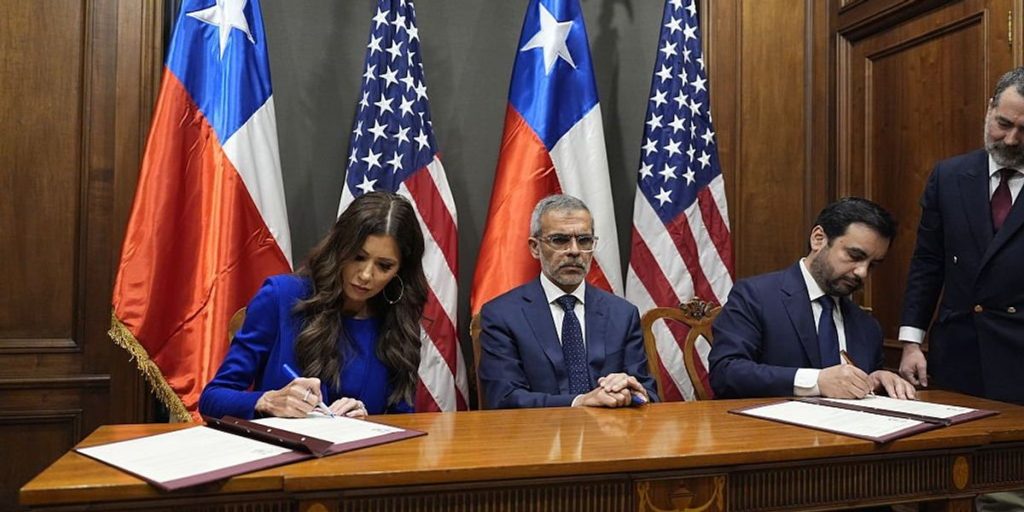Secretary of Homeland Security Kristi Noem has inked a deal with Chile’s ministers to further integrate Chile into the Biometric Identification Transnational Migration Alert Program (BITMAP). This collaboration aims at improving information exchange between the United States and Chile, particularly in tracking hardened criminals trying to enter the U.S. The move is crucial not only to tackle Chilean theft rings in the U.S. but also to block Venezuelans, associated with the Tren de Aragua gang, from accessing North America.
The agreement is a step forward in securing the Western Hemisphere. Noem emphasized, “America, Chile, and the entire Western Hemisphere will be safer because of these efforts.” She also pointed out that data-sharing benefits everyone except those who wish to cause harm, underscoring the importance of the BITMAP initiative.
With over a million Venezuelans in Chile, the country has been grappling with the Tren de Aragua for some time, especially amid the Biden-Harris border crisis. The BITMAP system is seen as a vital tool in identifying and tracking criminals, terrorists, and other dangerous individuals attempting to breach borders. The partnership with Chile is proof of the commitment to enhancing security on both sides.
This agreement is particularly noteworthy given that Chilean President Gabriel Boric leans far to the left and has been critical of former President Donald Trump’s trade strategies. Despite differing political ideologies, this partnership signifies a united front against common threats. It underscores the importance of setting aside political differences to prioritize the safety and security of nations.
The initiative is part of broader efforts to strengthen alliances against leftist influences in the region. It’s no secret that the Biden administration’s border policies have been a point of contention, and this agreement with Chile is a statement of intent from those who believe in tougher control. The White House is actively working on building coalitions with like-minded nations to counteract left-wing policies.
Javier Milei, a prominent figure aligned with conservative values, has also entered into a significant agreement with Kristi Noem. This collaboration highlights the ongoing efforts to form a coalition of nations against leftist ideologies. The united stance is aimed at reinforcing the security and prosperity of the region.
As the U.S. and Chile move forward with this agreement, the benefits of such partnerships become increasingly evident. The focus on biometric data sharing is a testament to the advancements in technology that aid in keeping nations safe. It’s a clear message to those who threaten the peace and safety of the hemisphere: cooperation and vigilance are stronger than ever.
The BITMAP initiative is expected to be a game-changer in how nations deal with transnational crime. By pooling resources and information, the U.S. and Chile are setting a precedent for other nations to follow. The strategy is simple yet effective: work together to ensure the safety and security of citizens.
Despite the challenges posed by differing political viewpoints, the agreement between the U.S. and Chile shows that common goals can bridge divides. It’s a reminder that when it comes to security, collaboration transcends political ideologies. The focus remains on protecting communities and ensuring a secure future for all.
By integrating Chile into the BITMAP program, the U.S. is taking a proactive approach to border security. This partnership is a demonstration of how international cooperation can combat crime efficiently. Both nations stand to benefit from this enhanced collaboration, which is a win-win for security and stability.
The emphasis on data-sharing through BITMAP is a strategic move to keep criminals at bay. It’s an example of how countries can use technology to their advantage in the fight against crime. The U.S. and Chile’s agreement is a model for how security partnerships should be structured in the modern age.
This collaboration with Chile aligns with the broader goals of the U.S. to establish strong relations with key allies. The focus remains on fostering a secure environment that deters criminal activities. It’s a clear indication of the commitment to maintaining peace and order in the region.
As the BITMAP program progresses, the positive impact on border security is anticipated to grow. The partnership with Chile is just the beginning of what could be a more extensive network of cooperation. The shared goal is clear: to protect citizens and ensure safe borders.
The agreement reflects a strategic approach to addressing the challenges posed by transnational crime. Through cooperation and information-sharing, the U.S. and Chile are setting a standard for how nations can work together. It’s a testament to the power of collaboration in achieving common security objectives.
The initiative also highlights the importance of using technology to combat crime effectively. By sharing biometric data, the U.S. and Chile are taking significant steps toward a safer future. The agreement is a reminder of the importance of alliances in overcoming shared challenges.
As the partnership between the U.S. and Chile continues to develop, the focus will remain on enhancing security measures. The cooperation between the two nations is expected to serve as a blueprint for similar agreements in the future. It’s a commitment to safeguarding the region against criminal threats.
The BITMAP agreement underscores the necessity of international cooperation in addressing security concerns. By working together, the U.S. and Chile are paving the way for a more secure Western Hemisphere. The collaboration is a proactive measure to ensure that citizens are protected from transnational crime.
In conclusion, the agreement between the U.S. and Chile is a significant step in the right direction. It’s a demonstration of how cooperation can lead to enhanced security and stability. The partnership serves as an example for others to follow in the fight against crime.



